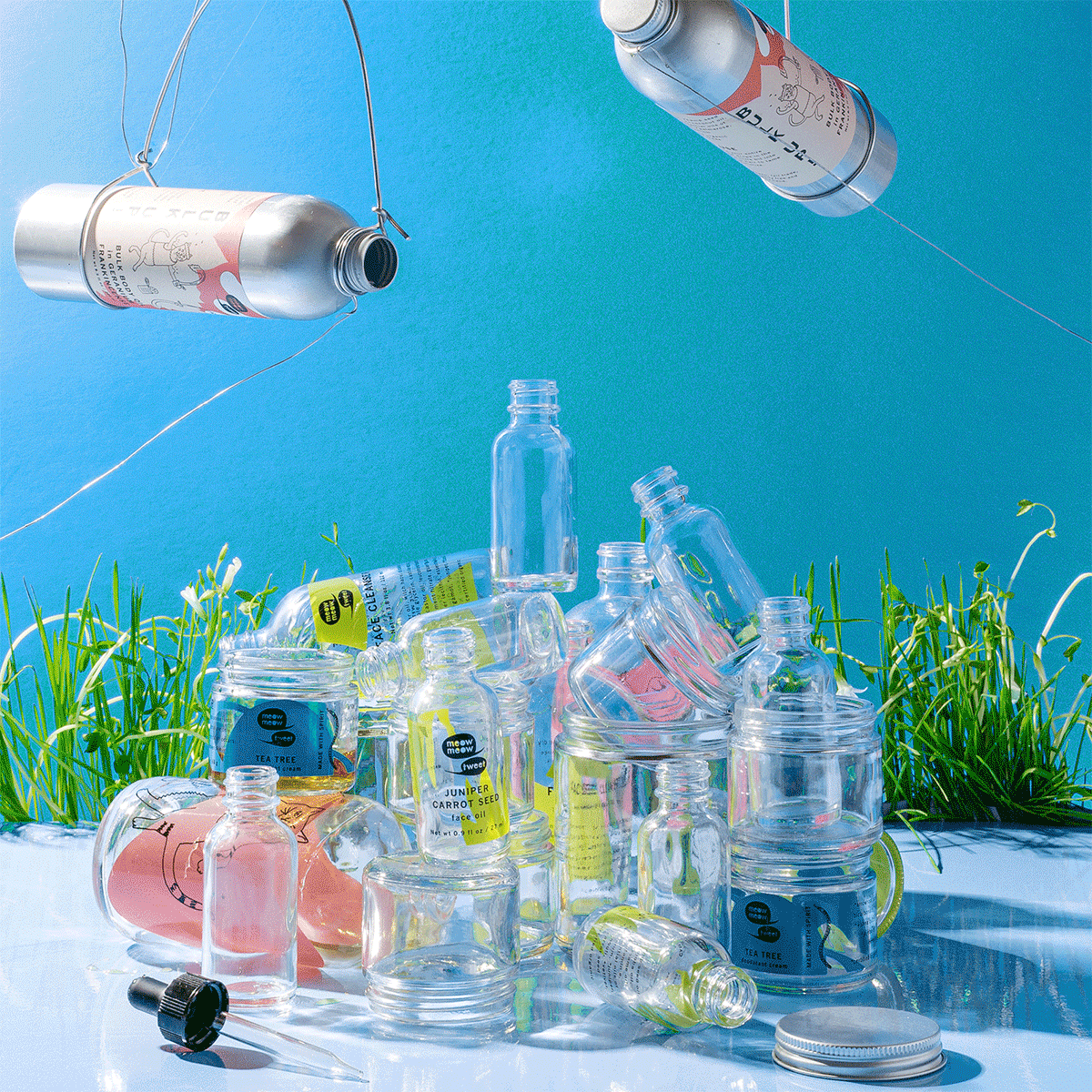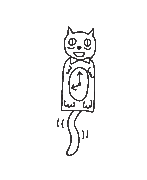
Welcome to Our Bulk Aisle!
It’s like Costco, minus the intimidatingly large shopping carts. Okay, wait, it’s nothing like Costco, but I wanted to give you a quick way to think about “bulk.” You could also look at this New Yorker cartoon of two pelicans if you are more of a visual learner.
The idea is simple. You buy more of a thing you like a lot (i.e., you “stock up”) and in return, you save money, reduce the amount of trips your packages have to make to you (read, less carbon waste), and you produce less trash.
Our concept has a twist though. There’s a “refill” component!

→ How to Bulk Up ←

01.
You start with one full-sized bottle of, say, face oil. Obviously, you’ve fallen in love, so you think, hmmm, I wish there was a way I could reuse this cute glass dropper, and just put more face oil in this container…

02.
Ding, ding, ding!! You CAN, you brilliant person! Save your cute glass dropper bottle. Click your paw over to our website, and order the BULK size of the face oil. That bottle is made from the most recyclable material available, aluminum. It has an aluminum cap, too. No glass dropper. You don’t need another one, because you are going to pour the BULK face oil into your sterilized (we show you how) cute glass dropper jar, and then add more as needed. (Oh, and it costs less per ounce. HOORAY.)

03.
Give yourself a pat on the back. You just did a thing that saved you cash and saved the world a tiny bit of trash (and possibly helped reframe the way we interact with things, if we’re feeling lofty; more on that below).

04.
But what about when the BULK bottle is empty? So glad you asked. You send it back to us (for free). Then, we sterilize it and refill it until the end of time or until the bottle is so dinged up that it has to go into the recycling bin, at which point we thank it for its service and for the long life of circularity it lived and say a fond farewell.

Circles & Loops
This is not a euphemism for a cat toy that goes in, um, circles and loops, but rather a quick pause to explain, systemically, what is happening when you treat a product as you just did in the above example.
It’s called circularity and a closed-loop system, and it’s a redefinition of the way we think about and treat the everyday things we consume. In fact, if you want to go deeper, it’s actually an affront to capitalism and a redefinition of the way we function (or could possibly function) as an economy and society.
Let me explain.
Circularity is about a mode of consumption that includes refurbishing, reusing, recycling, or even sharing a product for as long as possible before it becomes waste. It is the exact opposite of, say, purchasing a bunch of small cosmetics, all in their brand new containers, and then tossing them away half empty, only to buy more new small containers. I am not trying to shame anyone here. I have been guilty of this precise thing. But I think it’s because we have all been trained for an endless want and have somehow, societally, managed to forget about what happens to all of the single-use things we buy. We are disconnected from their life cycle. We don’t live with our trash, physically. When we’re done with something, it moves on to a nether space outside our imaginations (namely, a dump in the earth, in the ocean, or somewhere in another country that has been paid to take it). This is a sort of out-of-sight, out-of-mind situation.
Circularity proposes a way of existing in the world that makes the longest possible use of every single thing we own—like darning socks, sharing a car with a friend, repurposing waste water, or even refilling your face oil.
The problem with this model is that it is not as profitable for businesses as selling many tiny single-use things that will be thrown out and then immediately replaced. But “businesses” can not be our moral compass for any longer, and we’re fine with making a little bit less money, if it means that we can spare the planet some waste; and more than that, if it gives us a chance to dream about a world beyond the one we know—a new model of consumption that is not about endlessly consuming but rather about making the most of what we already have.
Closed loop can have a few different meanings, but for our purposes, we’re talking about closed-loop recycling and a closed-loop environment. Both are about the treatment of raw materials and are geared toward dramatically reducing, and in some cases, totally eliminating waste. Closed-loop recycling is the process of a material being used indefinitely or being able to be returned to its original raw material state once its use has been exhausted. It’s the reason we choose aluminum for our bulk bottles—aluminum is lighter to ship to you (reduced carbon footprint) and when you recycle it, the quality doesn’t degrade. It’s also the most recycled material worldwide. This is not to say that resources are not used in the process—we need water and energy to sterilize the aluminum bottles that we sell bulk products in—but the resources used are far fewer than what’s required to make a wholly new thing. A closed-loop business reuses materials over and over again to deliver new products. In a sense, it’s about creating a service rather than just a product. This is somewhat harder for us to achieve, because there are hygienic concerns that are super important. Some things just can’t go to more than one consumer after they’ve been opened and touched. But empty bulk bottles? Those we can sterilize and refill forever.
So, how many bottles do you actually save when you buy bulk? Let’s take a look.
Bulk Aisle Math
One full-sized face oil lasts about TWO months, depending on how much you use.
It can be refilled FOUR times using the bulk size.
That saves FIVE small bottles from ending up in the trash. It saves you $35 in cash.
Over a lifetime of using face oil (30 years*), the savings of trash becomes 225 bottles and $1,575 in cash.
That’s a lot of saved trash / cash. And that’s just one person.
*not promising that our small bottles will last 30 years, but they just might if handled with care.
Refill Online or IRL
You can refill online as above, or you can visit one of our in-person retailers who we supply with bulk refills. These amazing indie shops have refill stations set up for you in person, and you can bring any jar you want to fill up with our goods (not just a Meow Meow Tweet bottle). This is a nice way of getting to know your MMT community out in the wild. Plus, if it’s a place you can visit on foot or by bike, you’ve also reduced the carbon impact of shipping your product.
Shopping definitely will not save the planet, but there are small things we can do to produce and consume less stuff. Personal agency is also a magical ingredient for hope. And we need that, too.
Written By Vera Kachouh


